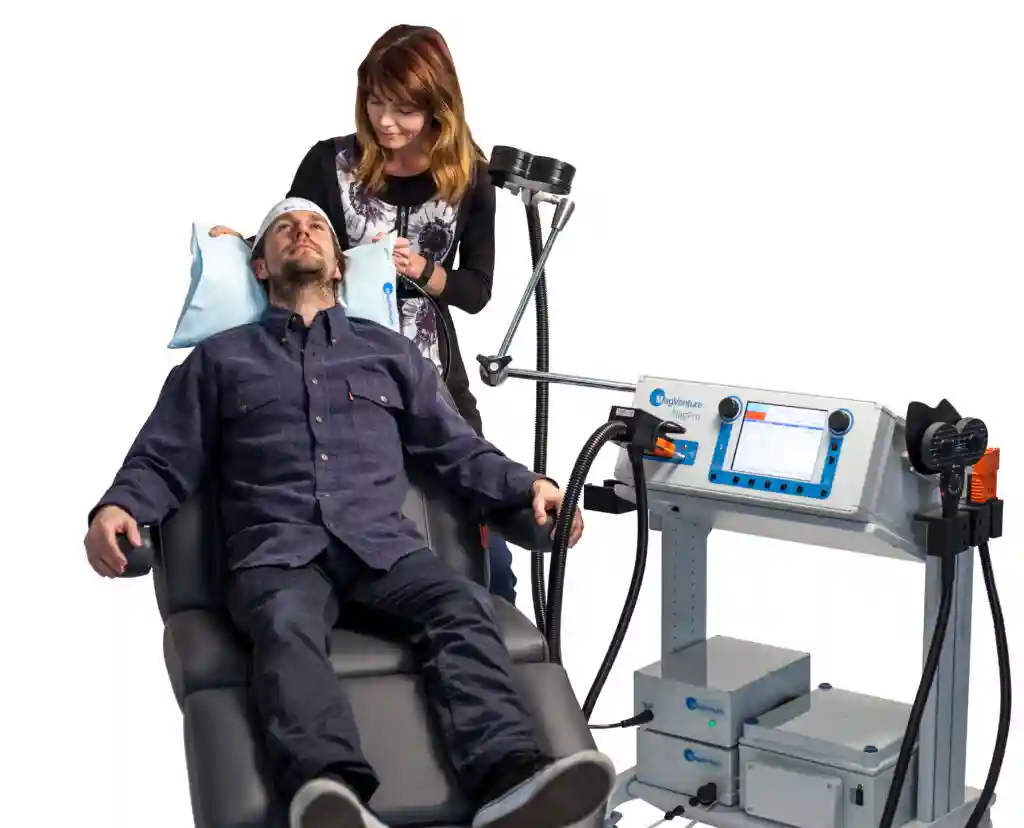At Cedar Park TMS, we know healing your mental health is a journey. Selecting the right treatment can require considering many different factors. Because of this, we take special care in educating our patients about all the available treatment options.
This article compares Austin TMS therapy vs. other treatments, including medication, psychotherapy, and ECT. For more personalized guidance, speak to one of the specialists at Cedar Park TMS. Our team would be most happy to help you choose the best option for your needs, whether that is TMS therapy or another form of treatment.

TMS (transcranial magnetic stimulation) is a physical treatment designed to treat the symptoms of lowered brain function. It gently stimulates the brain with electromagnetic waves to activate regions affected by mental health conditions.
Here are just a few reasons why TMS therapy can be a strong treatment option for our Austin patients:
Schedule a consultation with Cedar Park to discover if TMS therapy suits you.
When patients consult their healthcare providers for mental health treatment, medication is usually the most prescribed and recommended option.
Antidepressants can offer positive effects on your mental health, including symptomatic relief and mood elevation. Another significant benefit of medication treatment is that they are well-studied in clinical research trials and are generally considered very safe when used as intended.
However, medications can come with unpleasant side effects that can wreak havoc on your life, including:
Medication also does not work for everyone. Many patients have had to switch between medications with unsuccessful results or found that they did not alleviate mental health symptoms.
Psychotherapy is a valuable tool for managing various mental health challenges. It involves one-on-one sessions with a registered psychotherapist, which can also be conducted in groups or virtually. These sessions aim to uncover the root causes of your issues.
While psychotherapy does not address the biological aspects of mental health conditions, it helps you manage symptoms and improve daily functioning. It is accessible to many patients, including children and pregnant women, who may not be eligible for other treatments.
However, psychotherapy has its drawbacks. It can be costly, mainly if someone is not covered by insurance. Results can take months or years to manifest, and some patients may not experience significant improvement.
Electroconvulsive Therapy (ECT) is a physical treatment that involves inducing controlled seizures with electrical currents to stimulate your brain activity. Despite its daunting nature, ECT is a well-established and highly safe treatment—even for pregnant women throughout all trimesters. It is used for various mental health conditions beyond MDD and OCD, including bipolar disorder, schizophrenia, and severe cases of mania or catatonia.
ECT is typically recommended when traditional treatments, such as medications, are ineffective. The procedure is performed under anesthesia, making it painless for most patients, and is often combined with medication. However, it may cause temporary memory loss and is unsuitable for those who cannot tolerate anesthesia.
These treatments are usually administered three times a week over a period of one to two months, totaling six to twelve sessions. Post-treatment monitoring is required to check for serious side effects, and maintaining this schedule can be challenging for those with busy lifestyles.
Cognitive Behavioral Therapy (CBT) is an effective treatment for a variety of mental health issues, including anxiety, substance use disorders, relationship problems, and eating disorders. Unlike symptom-focused treatments, CBT aims to help patients change their thinking and behavior patterns. This may involve addressing fears and anxieties, teaching relaxation techniques, and enhancing problem-solving skills.
CBT offers numerous advantages to patients. Like traditional therapy, it is suitable for individuals of all ages, including pregnant patients. It can be delivered through various formats, such as individual sessions, group therapy, books, or videos, making it highly accessible. Additionally, it is beneficial for those who have not responded well to medication, including individuals with treatment-resistant depression.
However, CBT can be time-consuming, with progress potentially taking months or years, and the cost can be high if not covered by insurance. Additionally, CBT may not be ideal for patients with complex mental health needs or learning difficulties.
If you are currently struggling with the symptoms of a mental health condition and have not found relief, Cedar Park TMS can help. We offer various specialty treatments to our patients. Speak with our specialists today to discover if TMS therapy in Austin is right for you.